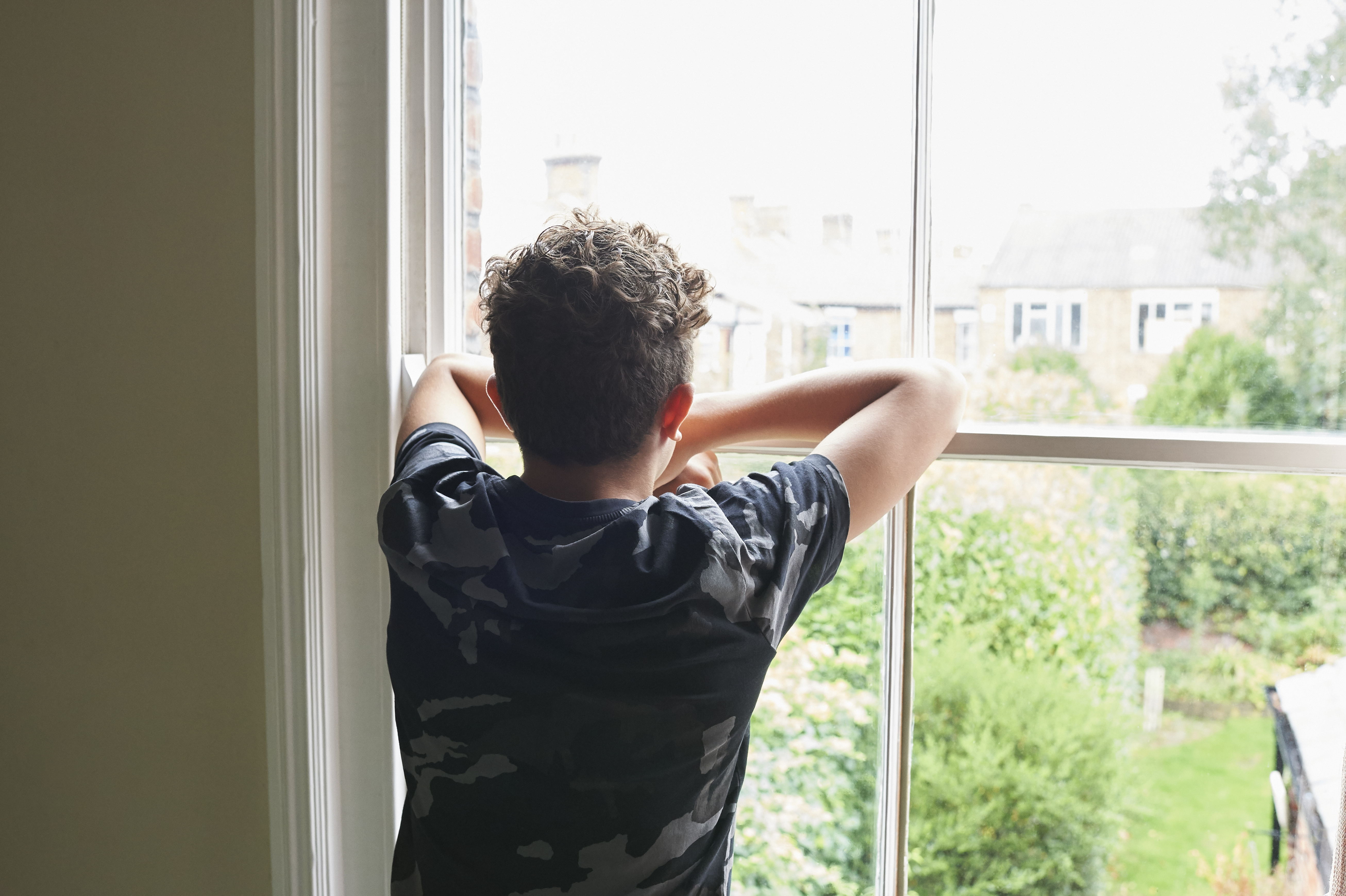I think my child is a bully - what can I do? 8 tips from an expert
What happens if your child is the one bullying? We have expert tips on how to approach the situation and stop the bullying behaviour.

While it’s incredibly hard to gain stats around how many children actively bully other children, we know much more about how many children are the victims of bullying.
According to the Office for National Statistics, an estimated 1,544,000 children aged 10 to 15 years (34.9%) in the UK experienced an in-person bullying behaviour in the year ending March 2023. Put simply, more than one in three of our kids are being bullied. So we know it’s a huge problem in our schools. But what happens if your child is the one doing the bullying?
Kieran Lyons, Service Head for Childline and NSPCC, tells GoodtoKnow: “We think we know everything there is to know about our children, so it can be upsetting to find out that your child might be bullying someone else.” Bullying can be caused by a range of factors, from poor mental health and low self-esteem to harmful home environments. While we’d never condone bullying, it’s important to understand why people bully.
Kieran has given us his expert tips on what to do if your child has been accused of bullying. We also hear from a parent whose daughter was accused of bullying and offer practical steps on how to encourage your child to be more empathetic and end their bullying behaviour.
I think my child is a bully - what do I do?
Stay calm, lead with curiosity, start a conversation to ask questions, and remind them you're on their team and there to help them through anything. Try to understand your child's perspective and look to identify any contributing factors that might be at play such as jealousy - emotions drive behaviour. Use empathy, connection and positive reinforcement not punishment. Work at strengthening your bond and doubling down on your connection. Also, don't do this all alone, reach out for support for you and your child and be kind to yourself - this is a tricky one to tread.
Bullying is a complex issue that stems from personal and environmental factors. Bullies often seek control or revenge, sometimes as a result of being bullied themselves. Insecurity is a major cause, with bullies using aggressive behaviour to mask their own feelings of inadequacy or low self-esteem. According to education expert Carey Ann Dodah, insecure individuals may act out to compensate for perceived weaknesses. This aligns with research from Psychology Today, which suggests that bullies often lack social skills and struggle with paranoia or hostility.
Peer pressure also plays a role, as some individuals bully to fit in with certain social groups. A lack of empathy is a common trait among bullies, allowing them to harm others without understanding the emotional damage they cause.
Parenting advice, hot topics, best buys and family finance tips delivered straight to your inbox.

We also know from this 2023 study that the bully’s environment influences behaviour, including family dynamics and school settings. Negative home experiences or unsupportive schools can contribute to aggression. Some bullies grow up in environments where harmful behaviour is normalised. While understanding these factors is important for addressing bullying, it is never acceptable, as bullying inflicts lasting emotional harm on victims.
“I was mortified to get a call from the school to say that my 13-year-old daughter was a bully,” recalls mum Christy. “It broke my heart to think that she had deliberately tried to hurt and exclude another girl.”
We’ve spoken to the NSPCC’s Keiran Lyons to get his expert tips on what parents can do if they think their child is a bully.
1. Stay calm and gather information
If you have suspicions or are made aware that your child may be bullying others, the most important thing to do first of all is to think about how you are going to handle the situation. Being told that your child is bullying others can often ignite a defence response from a parent as they don't want to believe that their child is impacting others. The term bullying can mean different things to different people so it’s important to look at what has been happening so you have as much information as possible before speaking to your child about it.
2. Have a calm conversation
Once you have taken some time to review the situation, it is important to have a calm conversation with your child about what has been happening. Often these conversations can be fuelled by emotion but if you are able to remain calm to hear what has been going on for your child, this can really help you both get the most of this conversation.
“I sat down with my daughter and asked her lots of questions about why she was behaving like that in school,” says Christy. “I had to be incredibly patient and contain my own anger to get to the bottom of her behaviour, and it was so hard for both of us.”
3. Understand your child’s perspective
Try to understand what has been happening from your child's perspective, but consider this against the rest of the information that you have. For example, the child that is being bullied may have said things that have influenced your child, but that doesn't make it okay that the bullying has taken place.

4. Identify contributing factors
It can be useful to understand what factors have contributed to the bullying. For example, many young people tell the NSPCC that they are being bullied because other children feel that they are different. If this is the case, you may want to work with your child about how they can celebrate differences.
“Eventually, my daughter broke down and told me that she missed her dad (we’d been through a messy divorce the year before) and was jealous of the other girl because she had a stable family and enjoyed doing things with her own dad,” says Christy. “All of the bullying stemmed from my own daughter’s poor self-esteem, sadness and jealousy. It was heartbreaking to hear.”
5. Use positive reinforcement, not punishment
Each parent will have their own view on how they can discipline their child. It is important to remember that your child may have something going on that has contributed to their behaviours. Physical punishment can have long-term and harmful consequences for children, and evidence tells us that positive reinforcement has a much greater impact on a child’s behaviour and wellbeing.
6. Strengthen your bond
When parents find out that their child might be a bully, it can surprise them as they think that they know their child inside out. It can help to turn this into a positive experience of trying to spend more time with them to build your relationship - doing things that you both enjoy can help them to know they can turn to you if they need to.
“While I couldn’t directly influence my daughter’s relationship with her dad”, says Christy. “I could change my relationship with her. So we did lots more things together, like having our nails done and going on day trips. Over time, our relationship improved and she settled down and became much happier. I didn’t get another call about bullying and I know she really regrets how she treated the other girl now.”
7. Seek support for your child
Remember that there is support for your child out there. Childline is a confidential space and is always available to talk to any child in the UK either online or over phone. Their trained counsellors are available 24/7 to help young people with any worries, concerns or questions – no matter how big or small they might feel. Simply visit childline.org.uk or call 0800 1111.
8. Don’t be hard on yourself
One important point is that you should not be too hard on yourself. Things often don’t go to plan in our children's lives, and parents often feel it is a por reflection on themselves. So they can be worried about reaching out for support. You don’t need to go through this alone; there are many options for support available - one of them being the free NSPCC Helpline which provides adults with a place to get advice and support, share concerns about a child or get general information about child protection. Adults can reach out to the NSPCC Helpline, on 0800 800 5000.
How to help your child stop bullying behaviour
Here are some practical tips you can use to help your child be more empathetic and understanding and reflect on their behaviour.
- Encourage your child to stop and think before saying or doing something hurtful. Everyone deserves to be treated with kindness.
- If your child feels like being mean, suggest they engage in another activity, such as playing a game or talking to a friend.
- Encourage them to talk to a trusted adult who can guide them in being kind and managing their emotions effectively.
- Teach your child that everyone is unique. Differences don’t make someone better or worse, just different.
- If your child has bullied someone, encourage them to apologise. A sincere apology can help repair relationships and alleviate guilt.
- Help your child understand why they engage in bullying behaviours. It could stem from stress, low self-esteem, or unresolved emotions.
- Teach them healthier ways to handle stress, like talking to someone they trust or practising stress-relief techniques.
- Make sure they understand the potentially serious effects their actions can have on others, such as emotional harm or long-term trauma.
Featured experts

Carey Ann is a founding member of one of the UK’s leading tuition providers, Explore Learning. She has over 20 years’ experience working in supplementary education supporting children aged 4-16 and the tutors that inspire them. She also has experience in school governance and chairing the school PTA (Parent Teacher Association). Mum to two teenage girls she is passionate about making a difference to our future generations and helping them discover the joy in learning.

Kieran Lyons is currently the Service Head for Childline at the NSPCC where he leads the operations in London and the service's Virtual base. He has worked at the charity in different roles over the past 10 years from being a Volunteer Counsellor to his current role. He has also held senior leadership positions at Crisis UK and within the adult social care sector.
Get more advice and information on tackling difficult subjects with your kids, from when and how to talk to your child about sex to how to talk to your kids about porn. Plus, worried your teen has stopped talking to you? Experts share five reasons why this is 'to be expected' and what you can do to help them.
Joanne Lewsley is mum to a tween, and freelance copywriter and editor who creates parenting, health and lifestyle content for evidence-based websites, including BabyCentre, Live Science, Medical News Today and more.